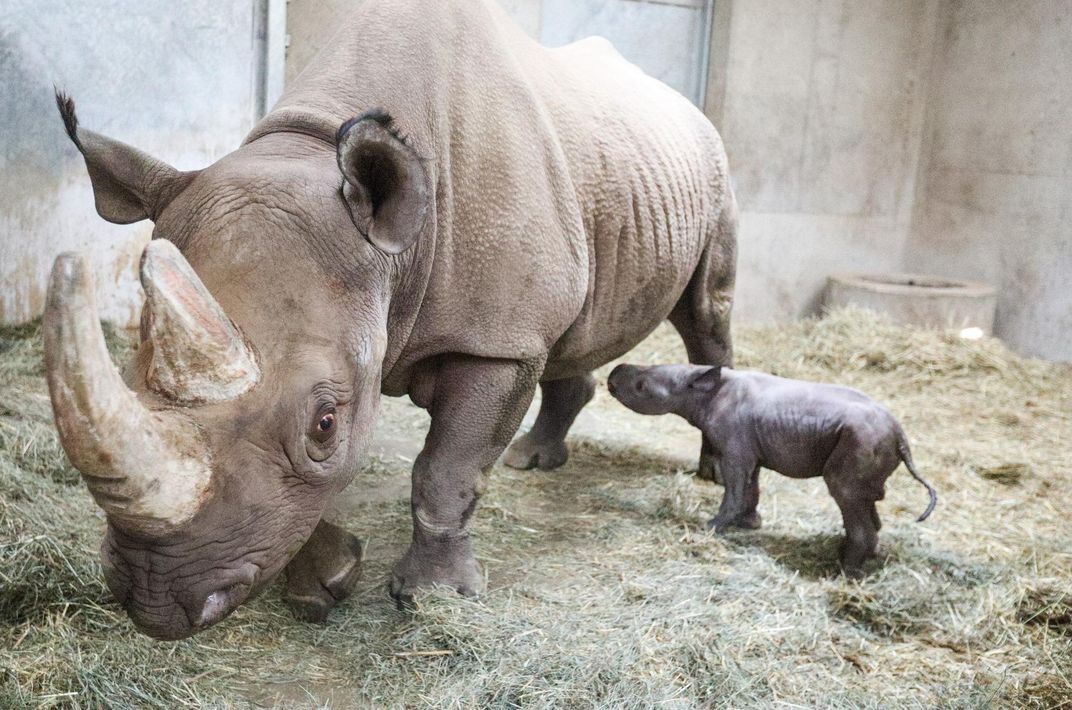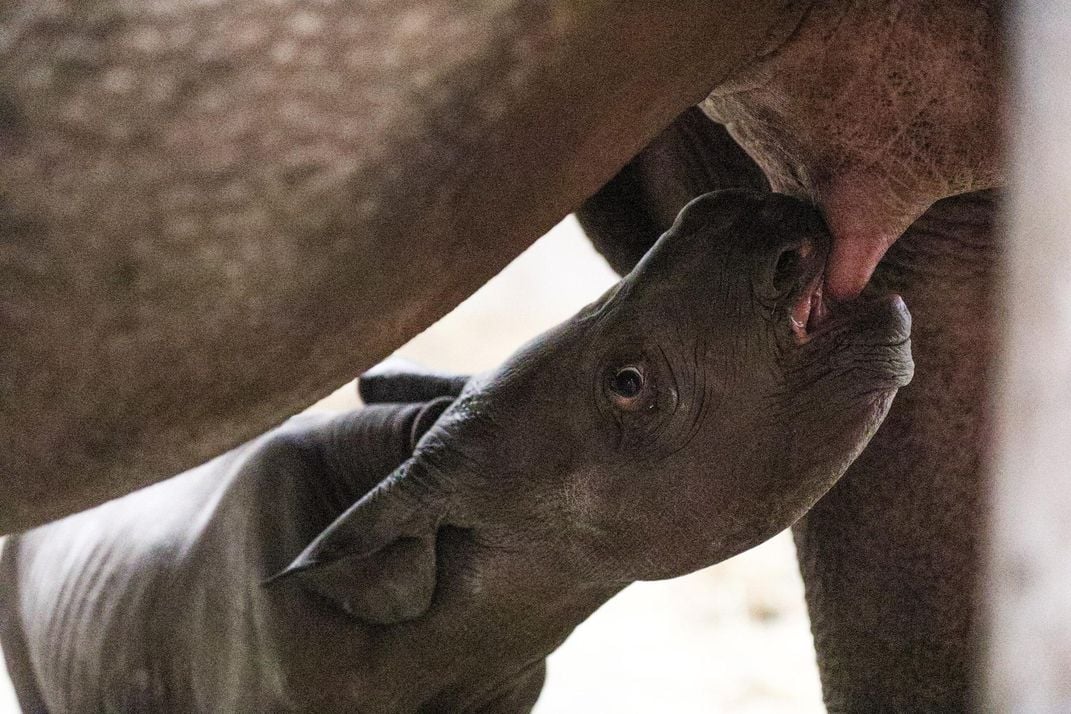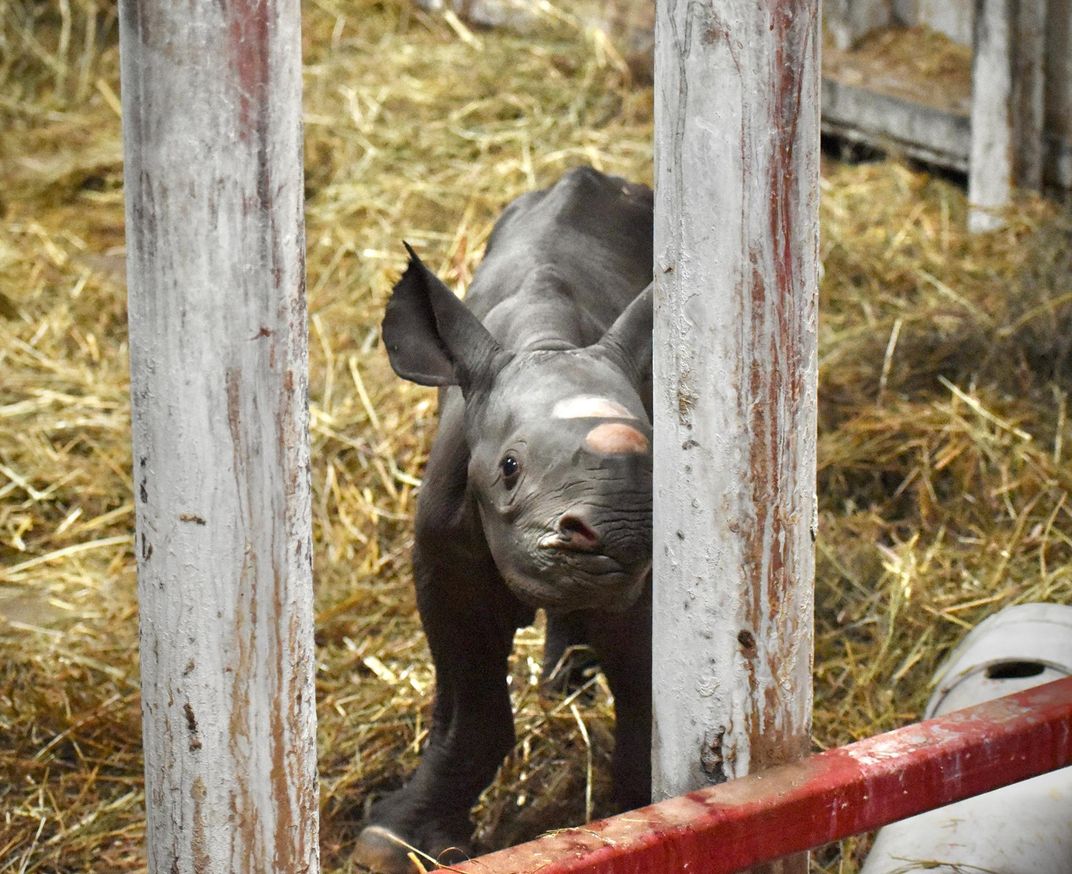Baby Black Rhino Born at Michigan Zoo on Christmas Eve
The birth of the yet-to-be-named male calf marks a milestone for conservationists trying to save the critically endangered species
/https://tf-cmsv2-smithsonianmag-media.s3.amazonaws.com/filer/54/f6/54f60e8b-eaa5-4acd-8563-2acac7429beb/81181070_10162720914400023_8598776718481686528_o.jpg)
The world now has one more black rhinoceros (Diceros bicornis). Born to 12-year-old mother Doppsee, a yet-to-be-named male calf was delivered as an “early holiday gift” at the Potter Park Zoo in Michigan on Christmas Eve, reports Derrick Bryson Taylor for the New York Times.
The birth marks a momentous first for the zoo, which has never before delivered a captive black rhino. The animals are “statistically and historically very hard to breed,” Pat Fountain, an animal care supervisor at the zoo, tells Taylor. In anticipation of the event, the zoo set up a video feed to broadcast the arrival of the calf, who tumbled into the world at 5:40 a.m. local time on Tuesday.
Just over 5,000 black rhinos remain in the wild—an improvement compared to the population’s all-time low from about 20 years ago, when numbers dipped below 2,500. But tens to hundreds of thousands of black rhinos roamed the plains and savannas of Africa prior to 1960, according to the World Wildlife Fund. Continued habitat loss, poaching and black market trafficking of the animals’ highly prized horns have since kept the species on the critically endangered list.

To conserve and rehabilitate the species, scientists are keeping close tabs on wild populations, many of which are in South Africa, Zimbabwe, Kenya and Namibia. A few dozen more are cared for in captivity, including Doppsee and Phineus, the new calf’s mother and father, who also reside at Potter Park. The pair’s coupling was hard-won and came with a heftier dose of science than fate: They were matched to breed through the eastern black rhino Species Survival Plan.
Among the zoo-dwellers, births are extraordinarily rare. On average, fewer than two calves are born each year to the handful of facilities accredited to breed black rhinos by the Association of Zoos & Aquariums in the United States, Taylor reports.
But the new calf’s arrival rounded out the decade with elation for the zoo and its fans. Within an hour and a half of his birth, he was standing; by mid-morning, he was nursing, Katie Mettler reports for the Washington Post.

Keepers are now monitoring both son and first-time-mom Doppsee behind the scenes. The public won’t get their first live viewing until the spring of 2020, according to a statement from Potter Park. To tide fans over until then, Potter Park will be posting regular photo and video updates to their Facebook and Instagram pages, as well as the zoo’s blog. So far, both rhinos seem healthy and appear to be happily bonding at the zoo’s rhino barn.
Eventually, the calf will have his own part to play in the survival of the species. After he’s grown a bit, experts will suss out his genetic profile and try to find him a good match in the “zoo dating world”—a process that could ultimately land him at a different facility to breed, as was the case with Phineas, his own father, Fountain tells Taylor at the Times.
Until then, zoo staff have plenty to celebrate. “This is a monumental moment for Potter Park Zoo that has taken our staff years of planning and hard work,” Cynthia Wagner, Potter Park’s director, says in the statement. “We are dedicated to conserving rhinos and couldn’t be more excited about this successful black rhino birth.”

/https://tf-cmsv2-smithsonianmag-media.s3.amazonaws.com/accounts/headshot/10172852_10152012979290896_320129237_n.jpg)
/https://tf-cmsv2-smithsonianmag-media.s3.amazonaws.com/accounts/headshot/10172852_10152012979290896_320129237_n.jpg)